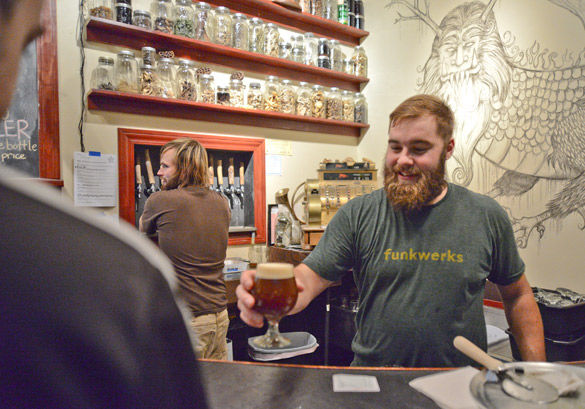Southern Illinois breweries are on the rise

October 27, 2014
Traveling around southern Illinois in hopes of pleasing your pallet with the taste of a smooth alcoholic beverage ten years ago would have introduced you to an exclusive selection of wineries and vineyards.
For beer drinkers, the selection would have been much more limited.
With the recent boom of breweries in the area, the production of craft beer has increased.
Advertisement
One of the first breweries to emerge was Big Muddy Brewing, founded by Chuck Stuhrenberg in 2009.
Stuhrenberg began home brewing as a hobby in the 1980s while attending SIU. His first customers were wineries in the area.
“Four of the wineries that all served beer wanted my beer right away, because they had so many tourists come in asking for some local wine and local beer,” he said. “They never had any local beer to offer until I opened up, so now they had local beer to offer their customers.”
For many years, Illinois breweries were allowed to distribute their own beer specifically in-state without an external distributor.
Anheuser Busch, being a large out-of-state brewing company considered it unfair that local, in-state brewing companies had more distribution in Illinois and filed a lawsuit against the state.
It wasn’t until 2013 that a bill passed to allow craft breweries to double their production cap and continue moving beer independently.
Big Muddy Brewing increased its self-distribution capacity from 7,500 barrels a year to 15,000 barrels a year, helping the local business and economy, Stuhrenberg said.
Advertisement*
“Since we got the law passed, we’ve got about 50 new breweries [in Illinois], so it’s really sparked an explosion of breweries and creating jobs here in Illinois,” he said.
Stuhrenberg said they have grown at least 30 percent a year since the opening.
“The big challenge is to keep producing enough beer for our distributors so the shelves don’t go empty,” he said.
In the last few years, some of Big Muddy’s beer selection has been sold as far as New Jersey and Long Island. It also plans to reach future locations in southern Iowa and the Florida panhandle.
On the other side of the mass production spectrum, Scratch Brewing Company in Ava keeps the small-scale brewery atmosphere alive just a few miles outside of the Shawnee National Forest.
Scratch owners Marika Josephson, Ryan Tockstein and Aaron Kleidon opened their doors for the first time in 2013. All of the craft beers are brewed using natural ingredients from its 80-acre property.
“We are definitely happy brewing on a pretty small scale,” Josephson said. “It’s easier to source ingredients for smaller batches – but we’ve also grown since we’ve opened and we’re brewing bigger batches than we did when we opened.”
As far as the brewery’s future, Scratch plans to brew larger batches over a fire from time to time, she said, maintaining their natural ambiance and local feel.
“We really like the foraging angle,” she said. “We knew that we wanted to incorporate a lot of locally sourced things.”
Also located in a similar location as Scratch in Ava, Little Egypt Beer is in the middle of the spectrum.
The brewery has garnered a reputation for fine quality craft beer after its Hefeweizen, a style of wheat beer, earned a gold medal at the 2014 Great American Beer Festival in Denver.
“Business [since the festival] has increased across the board at like a 200 percent increase,” Ken Rhude, brewer and majority owner of Little Egypt said. “We’re making a lot of Hefeweizen these days.”
Rhude attended Siebel Institute of Technology in Chicago, where he studied the art of brewing beer before he moved to California.
After unsuccessfully trying to open a brewery in California for eight years, because of financial reasons, Rhude moved to southern Illinois with his wife and started home brewing and self-distributing.
“We got a lot more help from small business developments here,” he said. “They were very instrumental.”
Little Egypt Beer is one of the Illinois breweries that saw benefits from Stuhrenberg winning the lawsuit for self-distribution rights for small breweries.
Rhude said he found it easier for the brewery to load their beer for transportation themselves rather than paying a distributor a percentage.
Future endeavors for Little Egypt include opening another brewery closer to Carbondale, as well as distributing to areas such as Chicago, St. Louis and places scattered around southern Illinois.
“We’ll do about a 20,000 square foot facility with a 10-barrel brewing system that I can cycle three times a day,” he said. “So we’ll be making 150 barrels of beer a week, whereas this brewery does that in about a year.”
The beer industry in southern Illinois is still growing. The newest addition to the local beer scene, St. Nicholas Brewing Co., will open its doors Saturday in Du Quoin.
Chase Myers can be reached at [email protected], on Twitter @chasemyers_DE or at 536-3311 ext. 273
Advertisement







